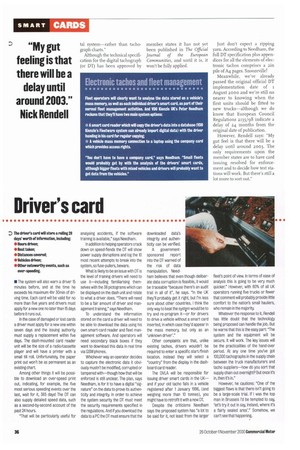Driver's card
Page 38

If you've noticed an error in this article please click here to report it so we can fix it.
The driver's card will store a rolling 28 days' worth of information, including: Hours driven; *Rest taken; *Distances covered:
Tit Vehicles driven;
Other noteworthy events, such as over-speeding.
II The system will also warn a driver 15 minutes before, and at the time he exceeds his maximum 4hr 30min of driving time. Each card will be valid for no more than five years and drivers must apply for a new one no later than 15 days before it runs out.
In the case of damaged or lost cards a driver must apply for a new one within seven days and the issuing authority must supply a replacement within five days. The dash-mounted card reader unit will be the size of a radio/cassette player and will have a printer with a small till roll. Unfortunate l the paper print out won't be as permanent as an existing chart.
Among other things it will be possible to download an over-speed print out, indicating, for example, the five most serious speeding events over the last, wait for it, 365 days! The DT can also supply detailed speed data, such as a second-by-second account of the past 24 hours.
"That will be particularly useful for analysing accidents, if the software training is available," says Needham.
In addition to helping operators crack down on speed-fiends the DT will show power supply disruptions and log the 10 most recent attempts to break into the system, so fuse-pullers, beware.
What is likely to be an issue with DT is the level of training drivers will need to use it—including familiahsing themselves with the 38 pictograms which can be displayed on the dash unit and relate to what a driver does. "There will need to be a fair amount of driver and management training," says Needham.
To understand the information stored on the card a driver will need to be able to download the data using his own smart-card reader and fleet management software. And operators will need secondary black boxes if they want to download this data in real time via GSM phones.
Whichever way an operator decides to capture the electronic data it obviously mustn't be modified, corrupted or tampered with—though how that will be enforced is still unclear. The plan, says Needham, is for it to have a digital "signature" on the data to prove its authenticity and integrity. In order to achieve the system security the DT must meet the security requirements specified in the regulations. And if you download the data to a PC the DT must ensure that the downloaded data's integrity and authen ticity can be verified.
A governmentsponsored report into the DT warned of the risk of data manipulation. Need
ham believes that even though deliberate data corruption is feasible, it would be traceable "because there's an audit trail in all of it", he says. "In the UK they'll probably get it right, but I'm less sure about other countries. I think the only way to beat the systgm would be to try and re-program it—or for drivers to drive a vehicle without a smart card inserted, in which case they'd appear in the mass memory, but only as an 'unknown driver',"
Other complaints are that, unlike existing tachos, drivers wouldn't be required to enter a specific start/finish location. instead they will select a "country" from the display in the dashboard card reader.
The DVLA will be responsible for issuing driver smart cards in the UK— and if your old tacho fails in a vehicle registered after 1 January 1996, (and weighing more than 10 tonnes), you might have to retrofit it with a new DT.
Despite the criticisms Needham says the proposed system has "a lot to be said for it, not least from the larger
fleet's point of view. In terms of ease of analysis this is going to be very much quicken" However, with 80% of all UK operators running five trucks or fewer that comment will probably provide little comfort to the nation's small hauliers, who remain in the majority.
Whatever the response to it, Bendell has little doubt that the technology being proposed can handle the job. But he warns that this is the easy part: "The system and the equipment will be secure. It will work. The key issues will be the practicalities of the hand-over period. At any one time you've got 100,000 tachographs in the supply chain between the truck manufacturers and tacho suppliers—how do you sort that supply chain out overnight? But once it's in, then it's in."
However, he cautions: "One of the biggest flaws is that there isn't going to be a large-scale trial. If I was the top man in Brussels I'd be tempted to say, 'let's try it out in say. Ireland, where it's a fairly sealed area'." Somehow, we can't see that happening.












































































































